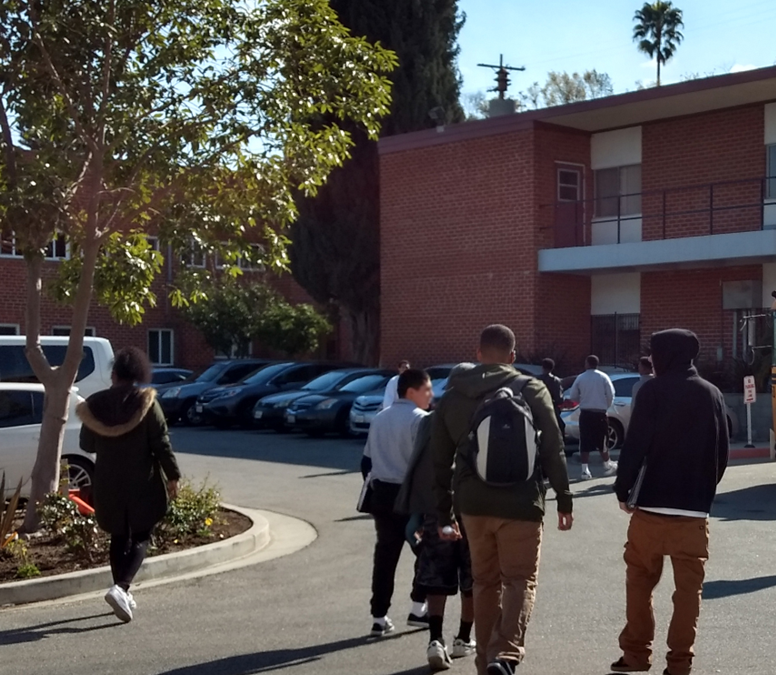
by Shelbrena Payne | Oct 22, 2020 | Feature, General, News
Los Angeles, CA. “It has been a difficult time, to say the least,” says Silvio Orlando, CEO of Optimist Youth Homes & Family Services. During the beginning of the pandemic, purchasing personal protective equipment was no easy feat. Still, resident students have been able to stay on campus while taking classes remotely. Prior to the pandemic, they’d walk from class to class, as seen above. Online learning is one of the many challenges faced by the organization. However, Optimist Youth Homes & Family Services remains devoted to the mental, educational, and physical wellbeing of all the foster children, young adults, and families they serve.
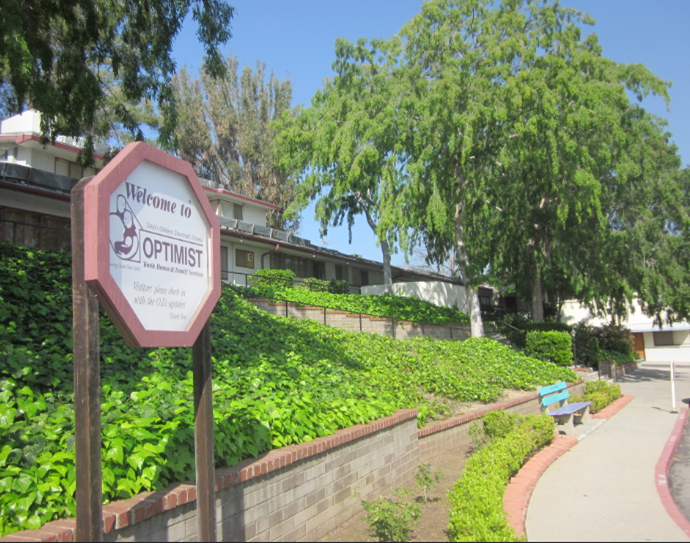
Welcome to Optimist Youth Homes & Family Services
Covid-19 continues to impact the lives of millions of American schoolchildren, including the at-risk and foster youth at Optimist Youth Homes & Family Services.
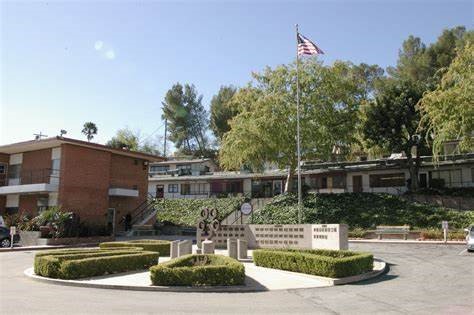
Optimist Youth Home & Family Services is still serving the community for many years.
In June of 2020, Optimist Youth Homes & Family Services was forced into lockdown when several students and staff members became infected. “The virus not brought in by a student but a staff member,” says Silvio. Continuously educating the staff on Covid-19 and how to prevent the spread remains a top priority. Since the outbreak staff have become more compliant. Working with the Public Health Department and County to ensure the health and safety of students and staff has been a tremendous success. The Public Health Department stated Optimist Youth Homes & Family Services was “doing great.” There have been no outbreaks since.
Foundation grants have been made more readily available and leniency has been given during this time. While cash donations have not seen an increase, non-cash donations have. The non-cash supplies have included face masks and hand sanitizers.
Optimist Youth Homes & Family Services have a lot of committed mentors and volunteers who work with and for the students. Unfortunately, “volunteers would like to be involved at this time,” says Silvio but due to the safety measures put in place for the children and staff, no volunteers have been allowed.
“We are coping, and our spirits continue to stay high,” as the holiday season is around the corner and major events such as the Mentor Award Gala maybe postponed or canceled. “Major events that raise money are no more,” says Silvio. The decline in monetary donations has sparked the robust creativity by Annie Nuttall, Chief Advancement and Communications Officer and staff leading to new opportunities such as drive-in events, and this year’s Holiday Wish List.
Optimist Youth Homes & Family Services continues to combat the stigmas surrounding mental health. Highly trained therapists provide a variety of integral therapeutic services tailoring to each person’s needs. Offering a wide variety of residential and community therapy programs. These programs are essential to the development and well-being of the children, young adults, and families they serve. Outpatient therapists have been a vital resource during the pandemic. Therapy sessions over zoom have worked exceedingly well. Virtual therapy sessions are safer and some clients find the alternative more enjoyable. Optimist Youth Homes & Family Services is working to keep the virtual services and outreach on mental wellness, well into the future even after the pandemic.
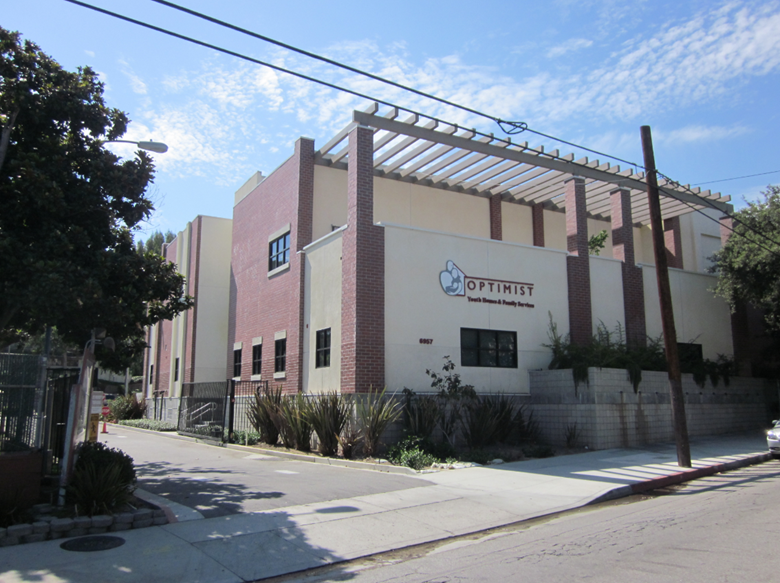
Optimist Youth Homes & Family Services campus building.
From Optimist Youth Homes & Family Services:
With your help, Optimist Youth Homes & Family Services can continue to provide, care for and transform the lives of the at-risk foster youth, children, young adults, and the families in the community they serve.
OUR MISSION
Our mission is to provide innovative and individualized treatment, education, and support services to children, young adults and families to better their lives.
OUR VISION
Optimist envisions a world where all children, young adults, and families will have the opportunity to receive the care and support they need to succeed.
Visit Optimist Youth Homes & Family Services for more information. Also, see their donation page, and this year’s Holiday Wish List.

by Julia Rajkovic | Oct 19, 2020 | Coming Up, General, News
Los Angeles, CA. The Los Angeles Humanitarian Initiative (LAHI) is a fairly new non-profit that was founded in response to COVID-19 in hopes of providing relief to at-risk populations in Los Angeles. Since COVID-19 started LAHI has worked hard to distribute resources to LA’s homeless population and Personal Protective Equipment (PPE) to frontline workers. “In some way, I’d like to think of LAHI as a product of my upbringing; my parents are the most loving and caring people I know and have inspired me to love and care for my community the same way they always have, especially during hard times like these,” says President and Founder Sandro Samaha.
LAHI has two main operations; Community Outreach and Healthcare. By partnering with homeless shelters and free clinics in Los Angeles, LAHI successfully caters to the needs of both of these sectors. Pictured below is the work of their Healthcare sector volunteers donating medical supplies to a local hospital.
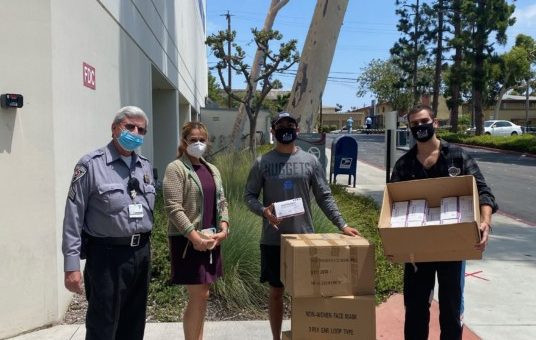
LAHI volunteers donate 7,000 surgical masks to Centinela Hospital
Vice President Dana Aboukahlil explained, “Though LAHI began as an initiative to provide relief to those who have been most affected by the pandemic, we have since widened our mission. Since our foundation, we have not only provided PPE all across Los Angeles county, but we have also raised funds for further matters important to our members, such as the Beirut explosion, the Black Lives Matter Movement, and most recently the conflict in Armenia.”
On October 18th, LAHI partnered with the owner of Mindful Bodies Fitness to host a virtual fundraiser. The fundraiser was a workout class held over Zoom. Speaking on behalf of LAHI, Operations Director Kian Heiat shares, “We are extremely excited about this partnership and happy to provide the public with a way to give back to the community in a fun and healthy manner!”. All proceeds will be donated to Venice Family Clinic and Hollywood Sunset Free Clinic which are local free clinics that offer comprehensive medical services to those who may otherwise go without them. Heiat says that LAHI will also be hosting a virtual yoga class the following Sunday for those who cannot attend and would still like to donate and participate.
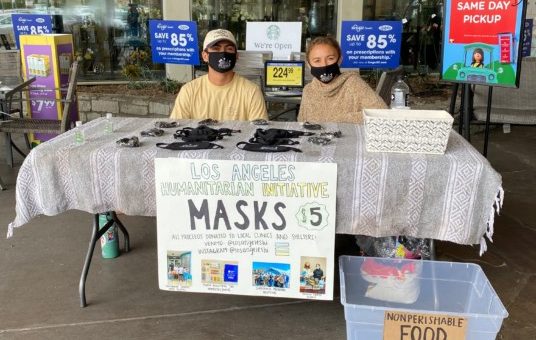
LAHI volunteers selling custom face masks and collecting non-perishable food donations outside of local Ralph’s
Another way LAHI raises money aside from fundraising and collecting donations is by selling custom LAHI face masks that can be purchased during a pop-up sale or through their website. All the money raised from these sales goes directly to local clinics, shelters, and hospitals.
“Being in LAHI has been extremely gratifying. Through this experience, I have become more familiar with the issues that are relevant to today’s society and have opened my eyes to the importance and power of helping others,” Aboukahlil reflects. LAHI is hoping to reach their goal of $60,000 in donations raised after this Sunday.
If you would like to make a donation to LAHI click here: https://losangeleshi.org/donate/
From Los Angeles Humanitarian Initiative:
Los Angeles Humanitarian Initiative (LAHI) is a community led non-profit organization that bridges the gap between donors and suppliers to support those in need of disaster relief. Inspired by the heroic actions of frontline workers, LAHI seeks to alleviate the pains of at-risk groups in the Greater Los Angeles Area affected by COVID-19.

by Shelbrena Payne | Oct 16, 2020 | Feature, General, News
Los Angeles, CA. The LA Opera awaits its cue to return to live performances on stage. Mozart’s Don Giovanni (seen above) is scheduled for January 30th, 2021.
Here’s some information about the show: Superstar bass Ildebrando D’Arcangelo returns as opera’s most notorious playboy in a visually spectacular production that pulls you into the characters’ inner thoughts and shifting emotions. And with James Conlon conducting this Mozart masterpiece and a new production featuring scenery by Es Devlin (star designer of concerts for U2, Kanye West, and Beyoncé).

Mozart’s Don Giovanni is scheduled for January 30th, 2021.
Meanwhile, the LA Opera company has turned to create an array of online content through the LA Opera At Home initiative, which will soon expand to include a series of exciting new Digital Shorts commissions as well as a November 14 stream of The Anonymous Lover by Joseph Bologne, the first known Black classical composer. Since the launch of LA Opera At Home in March, these popular online offerings have accumulated more than 740,000 views to date.
LA Opera is a non-profit organization dedicated to serving the greater Los Angeles community. LA Opera’s young artist program is generously underwritten by the Colburn Foundation, Eugene and Marilyn Stein, and Richard and Lenore Wayne. Tickets available now or as part of a Spring 2021 subscription package.

To access all of these programs and to learn more about current and future programming, please visit LAOpera.org/AtHome.
To access all of these programs and to learn more about current and future programming, please visit LAOpera.org
About LA Opera At Home:
LA Opera was the first major American opera company to create a weekly schedule of original new online programming to bring opera to audiences during the coronavirus crisis. LA Opera At Home launched on March 17 with the first in a series of live “Living Room Recitals” featuring artists performing in their homes. Other programming highlights include: “Opera Family Time” presentations created specially for families with children to enjoy together; “Learn at Home (Grown-Up Edition)” opportunities for opera lovers of any experience level to dive deeper into the art form; “From the Vault” streams of earlier performances; and “Backstage at LAO” features that take viewers behind the scenes for a look at what it takes to create world-class opera.
About LA Opera
Los Angeles is a city of enormous diversity and creativity, and LA Opera is dedicated to reflecting that vibrancy by redefining what opera can be with thrilling performances, thought-provoking productions and innovative programming. The communal and curative power of opera is needed now more than ever before, especially given the extraordinary challenges of the time. The company is grateful to its supporters for helping to ensure that it has the resources needed to get through this unprecedented period through the LA Opera Relief Fund. Those wanting to support LA Opera can go to LAOpera.org/donate.
More at LAOpera.org
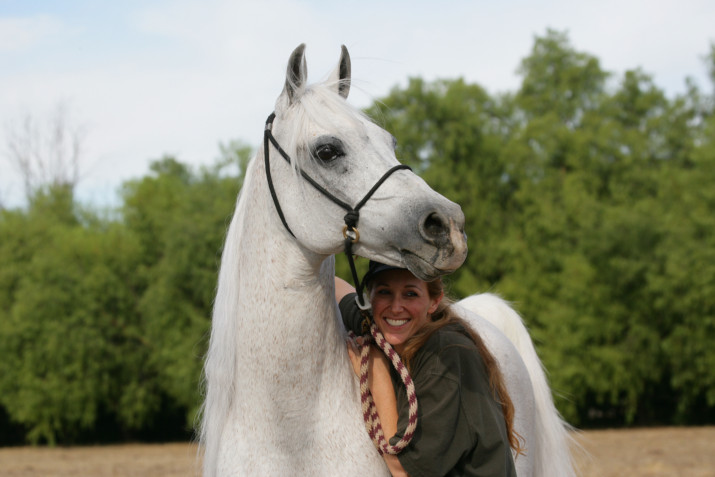
by Shelbrena Payne | Oct 14, 2020 | Feature, General, News
Los Angeles, CA. Saffyre Sanctuary is a horse rescue and rehabilitation program which cares for horses that have been abandoned, abused, or neglected. Today it’s facing challenges on every front. Volunteers and donations have declined, but the cost of operating Saffyre Sanctuary remains the same. It’s one of the many organizations that the COVID-19 pandemic has hit hard. Esta Bernstein Founder and C.E.O of Saffyre Sanctuary, explains, “It has been very challenging. Our donations have decreased by approximately 75% and with the quarantine restrictions set in place we have not been able to bring in volunteers we need.” The sanctuary saw a dramatic decline in weekly volunteers from 12 down to approximately 2-3 volunteers a week.
Esta Bernstein continues to work to keep the doors of the sanctuary open during the global pandemic. Saffyre Sanctuary was recently granted a U.S Small Business Loan, offered to nonprofits for sustainability purposes during the pandemic. The organization’s outdoor facility has provided Saffyre Sanctuary with an opportunity to partner with the City of Los Angeles Departments Rehabilitation Program. “The City of Los Angeles partners with another organization that pays students who recently graduated minimum wage to volunteer at the sanctuary.” This is a great volunteer opportunity for both the recent graduates to gain valuable work experience and the organization to continue operations.
Further positive developments that have emerged during the pandemic include increasing sanctuary locations. Esta Bernstein is in discussions with property owners looking to help the organization expand their mission by providing remote satellite locations for the rescued horses. She is hoping to have negotiations finalized this year. Expansion comes at a cost, the average monthly expense for one horse not excluding veterinary, chiropractic, supplements and dietary feed is $850.00 a month. Saffyre Sanctuary offers a Virtual Forster Care Program that allows individuals to sponsor a horse rescue. “Taking in horses won’t do any good if they don’t have money to feed them. We must develop a new foothold in the community,” said Esta Bernstein.
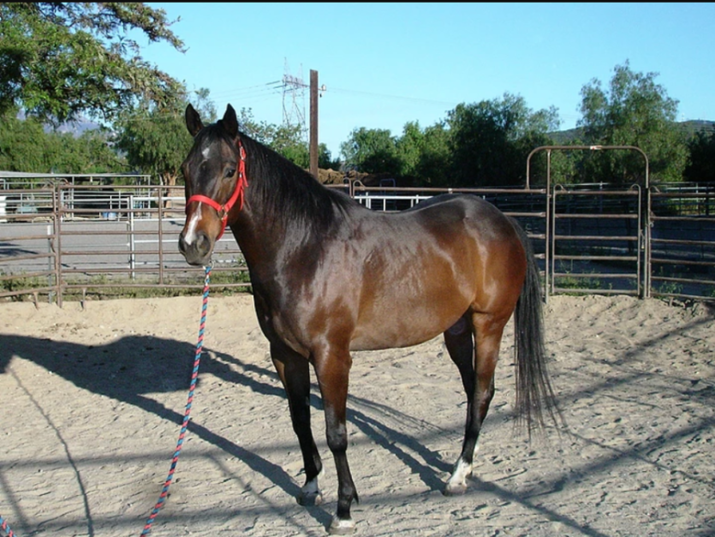
Foster Care Program: Lakota (which means friend) is a 15 year old Thoroughbred Gelding. Blind in one eye, he has been living at Saffyre Sanctuary since July 15th, 2012. Photo by Esta Bernstein.
Horse rehabilitation and healing of the soul is what the founder of Saffyre Sanctuary, Esta Bernstein is all about. One of the programs that Saffye Sanctuary offers is Equalia Actualization program. This program builds the bridge between the people in the community and the rescued horses. This experience allows for people of all ages including the physically impaired, to heal spiritually and emotionally along with the horses who to have experienced trauma.
Saffyre Sanctuary continues to rehabilitate mentally and physically abused horses with the help of committed staff, donors and volunteers during the pandemic. Esta continues to look forward to a brighter future for the health and wellness of the rescued horses and community members. “When you ask for nothing you receive everything, says Esta Bernstein Founder and C.E.O.
From Saffyre Sanctuary:
Saffyre Sanctuary, located in Los Angeles, California, is a horse rescue and rehabilitation program that cares for horses that have been abandoned, abused, or neglected. By allowing them to rediscover their true nature, we provide every opportunity for them to experience the possibility of enjoying a second career, or offer them a well-deserved retirement due to soundness issues, age, or owner hardships. Saffyre Sanctuary Mission: To rescue and rehabilitate horses and heal the world we share!
For more information on the organization please visit:
Saffyre Sanctuary
Saffyre Sanctuary – YouTube Channel
What’s Good!: Saffyre Sanctuary Spectrum News 1
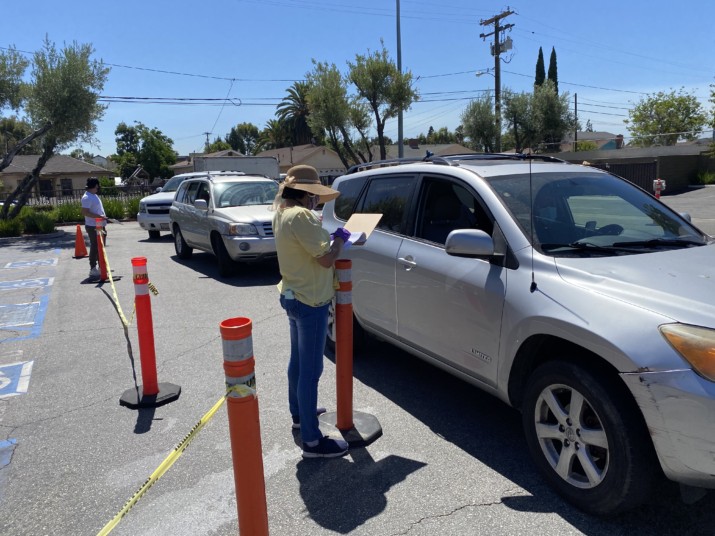
by Sydney Mathews | Oct 3, 2020 | Feature, General, News
Los Angeles, CA. During the beginning months of the pandemic, Inclusive Action for the City has helped to provide immediate cash relief for small businesses and street vendors who were not eligible for government financial support. One hundred and twenty street vendors impacted by COVID-19 received $400 cash cards in early June through the Street Vendor Emergency Fund (see above).
For several decades, tens of thousands of street vendors have served the residents and tourists of Los Angeles despite the fact it was a criminalized practice in the city. It wasn’t until 2008 when they came together to legalize street vending with the help of the organizations that specialized in community development like East LA Community Corporation (ELACC).
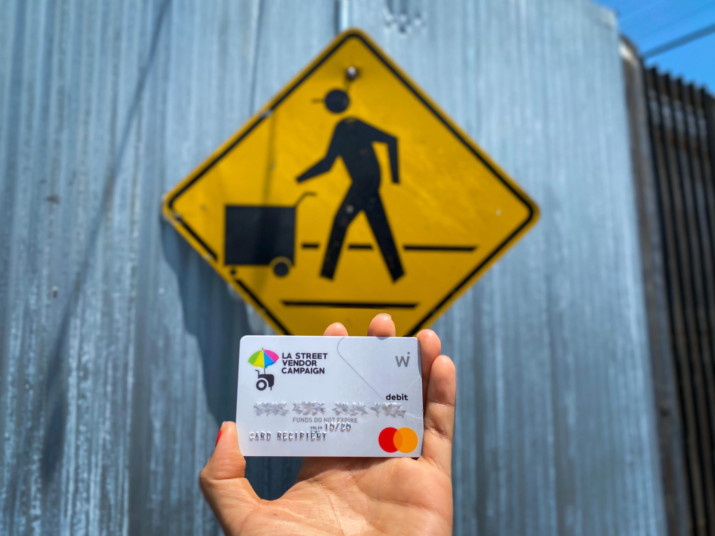
Cash Cards for Street Vendors were much appreciated.
As street vendors started working with nonprofits, the Legalize Street Vending Campaign: Leadership for Urban Renewal Network (LURN) was created and focused on advocating for low-income communities, primarily concentrated with small businesses.
It wasn’t until a decade later that the long-term efforts of LURN and other committed communities paid off. Street vending became legal in November 2018, and low-income entrepreneurs were able to take control of their businesses and take care of their families without risking their livelihood.
LURN would eventually be renamed to Inclusive Action for the City and two years later, as COVID-19 became a predominant concern, there was a need for immediate relief for small, informal businesses.
“Inclusive Action is a lender, we provide small business loans to entrepreneurs,” said Inclusive Action’s executive director Rudy Espinoza, “many of our clients are street vendors, and they were coming in already anticipating that they were not going to be able to make their payments.”
Street vendors are not generally eligible for small business relief funds or other forms of government-sponsored financial support. Espinoza and his team were aware of this and heavily discussed in mid-March whether or not they should provide loans to those who were struggling with the quarantine. However, Inclusive Action decided against this action.
“We should not be doing loans to people right now that are struggling, but we need to get people cash,” Espinoza declared.
It was decided that the best way to help street vendors immediately was to distribute $400 cash cards (seen above) that could be withdrawn and used however the individual chooses. The decision allowed for the creation of the Street Vendor Emergency Fund with the collaboration of ELACC and Public Counsel.
1,032 street vendors were given immediate relief with the fund over the summer but Espinoza believes its “a drop in the bucket” to the much larger systemic issue of street vendors not being eligible for government benefits and having to rely on nonprofit organizations for relief during the pandemic.
“There should be more systems to protect vendors and take care of them during pandemics,” Espinoza said, “and the fact of the matter is that many of them have been struggling for a long time.”
There is hope for vendors to receive more immediate relief and support by the city as the Sidewalk Vending Pilot Program was recently passed by the LA County Board of Supervisors which will invest $1 million in assisting vendors with health-compliant equipment, education outreach, and other needs that will allow street vendors to safely sell in unincorporated areas of Los Angeles.
If you have the means to donate to Inclusive City for the City to continue working to help street vendors, click here.
From Inclusive Action for the City:
Inclusive Action addresses the root causes of poverty by merging good urban policy with sound economic development initiatives that reduce barriers, increase opportunity, strengthen local economies, and empower low-income residents and entrepreneurs across Los Angeles.
Our programs and initiatives seek to uplift those who face the most obstacles to social and economic opportunity. Inclusive Action empowers communities by prototyping innovative, scalable solutions that seek systems change, generating models that can be replicated and applied to all types of urban environments.

by Sydney Mathews | Oct 3, 2020 | General, News
Los Angeles, CA. Executive Director Alexandra Suh (seen above) of KIWA (Koreatown Immigrant Workers Alliance) has announced in July of the organization’s support for establishing Public Health Councils in LA workplaces in an effort to prevent the spread of COVID-19.
As coronavirus cases continue to increase in LA, the LA Board of Supervisors approved a motion on July 21 that would allow worker-led health councils to be established to help monitor the safety of active workplaces.
The Department of Public Health in LA County were quickly overwhelmed with enforcing citations on businesses that did not follow the guidelines. With nearly hundreds of citations and thousands of more businesses to monitor, another proposal arose in September for the Board of Supervisors. for worker-led public health councils was announced to the LA Board of Supervisors with one major upgrade of allowing third-party organizations to assist in education,
KIWA has established itself as one of the first worker centers in the United States and opened its doors only two months before the 1992 LA Riots took place.
The organization’s foundational focus was to address “worker exploitation” among Koreatown workers.
Koreatown is known as the densest neighborhood in Los Angeles with populations predominantly made up of Koreans and Hispanics. The average income is comparably low to the rest of the city and the nonprofit started to bring these issue in the forefront of the LA Board of Supervisors.
KIWA began its mission by compensating Korean and Hispanic workers and business owners who were affected by the damages from the aforementioned civil unrest in 1992.
After nearly three decades KIWA continues to strongly campaign for a variety of city and neighborhood issues aimed to help disadvantaged working populations. addressing gentrification, ICE raids, and underpaid immigrant workers.
Recently, the organization has teamed up with other nonprofits to advocate and organize public health councils to monitor the health and safety of workers. The policy proposed to the LA Board of Supervisors would help monitor any instances of violation of CDC guidelines in the workplace and would be reported to the Department of Public Health to help prevent the spread of COVID-19 to LA citizens.
It is important to note that Los Angeles cases are increasing daily with roughly 1,000 more each day in the city alone as “pandemic fatigue” continues to settle in. The Public Health Council website has a counter of the numbers of cases updated every few days.
KIWA has a history of supporting causes that affect the city of Los Angeles and its county. The Healthy LA Coalition is one example
From KIWA: Workers for Justice:
Koreatown Immigrant Workers Alliance (KIWA)’s mission is to empower Koreatown’s immigrant workers in low-wage industries for dignity and respect in the workplace and community, and to work together with other communities to realize a vision of a just Los Angeles. One of the nation’s most established workers centers, KIWA is one of few community groups organizes both Korean and Latino workers. Our vision is to bring together workers, community members, and students in a broad, multi-ethnic coalition.




















